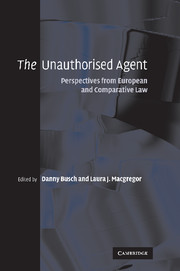Book contents
- Frontmatter
- Contents
- List of contributors
- Foreword
- Preface
- Abbreviations
- Table of cases
- 1 Introduction
- PART 1 The civilian legal systems
- 2 Unauthorised agency in French law
- 3 Unauthorised agency in Belgian law
- 4 Unauthorised agency in German law
- 5 Unauthorised agency in Dutch law
- PART 2 The common law
- PART 3 Mixed legal systems
- PART 4 International ‘codes’
- PART 5 Conclusions
- Bibliography
- Index
2 - Unauthorised agency in French law
Published online by Cambridge University Press: 07 September 2009
- Frontmatter
- Contents
- List of contributors
- Foreword
- Preface
- Abbreviations
- Table of cases
- 1 Introduction
- PART 1 The civilian legal systems
- 2 Unauthorised agency in French law
- 3 Unauthorised agency in Belgian law
- 4 Unauthorised agency in German law
- 5 Unauthorised agency in Dutch law
- PART 2 The common law
- PART 3 Mixed legal systems
- PART 4 International ‘codes’
- PART 5 Conclusions
- Bibliography
- Index
Summary
Introduction
Under the French rules regulating agency relationships, the essence of the ‘internal relationship’ is the power of representation that the agent has. In fact, the French civil code defines the mandat or procuration as ‘a transaction by which a person gives to another the authority to do something for the principal and in his name’. The main effect of this representation is that the principal alone will be bound by any acts entered into by the agent within his authority, in the name and on behalf of the principal.
The French Civil Code therefore defines the internal relationship solely by reference to the concept of representation. This is a restrictive approach, since the principal will only be bound when he consents to the agent's acting on his behalf within the limits of the authority defined by the mandate. This is confirmed by the fact that the civil code expressly stipulates that the agent cannot act beyond the authority granted by the principal in the mandate. The text further adds that the principal can only be bound to perform the undertakings contracted by the agent in accordance with the authority granted (Art. 1998-1 CC). For undertakings contracted by the agent outside the authority granted by the mandate, the principal will only be bound if he has ratified them expressly or impliedly (Art. 1998-2 CC).
- Type
- Chapter
- Information
- The Unauthorised AgentPerspectives from European and Comparative Law, pp. 17 - 60Publisher: Cambridge University PressPrint publication year: 2009
- 2
- Cited by

